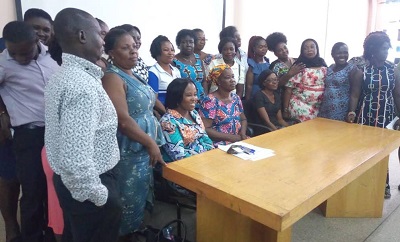
Participants at a regional education programme organised by the Western Regional office of the Department of Gender, have advocated that the country’s labour laws must be friendly towards the welfare of women employees.
They noted that the lack of unified front of the informal sector was also a major drawback, and called for an enabling environment for female workers in accordance with the provisions in the Labour Act, especially issues bordering on pregnancy and work.
“We are of the view that the Labour Law is not flexible to female employees in the informal sector, and therefore request a review of the Act,” they stressed.
The programme, with support from the Gender Centre for Empowering Development (GenCED), focused on women, the Ghana Labour Law and women’s rights at the workplace particularly to provide the space for women both in the formal and informal sectors to learn about the labour law and pregnancy, maternity leave, breastfeeding for nursing mother, dismissals, transfer of pregnant women, sexual harassment and overtime
The Western Regional Labour Officer, Ms Elizabeth Acquah, said pregnancy was a right and pregnant apprentices were not to be sacked but have the right to learn a vocation, explaining that, “if pregnancy intrude her learning, she should be released for a period.”
She added: “Annual leave and maternity leave are not one and the same. Apart from maternity leave, women are entitled to annual leave.”
The Acting Western Regional Director of Gender, Maribel Okine, told participants that the Labour Act covered all workers, no matter the status or sector they worked.
She said the National Labour Commission (NLC) had been mandated to providing education on the Labour law, to workers, but, unfortunately this has been lacking particularly, on those concerning women.
“This lack of education has resulted in human rights abuses such as unfair dismissals and the sexual harassment of women at the workplace, “Ms Okine added.
One key way to avoid some of the challenges, she said, was for females workers to scrutinise employment offers, including conditions of engagement “and not just accept anything because we need the income,” adding that “let be cautious of offers before acceptance.”
“A number of conventions and charters have been agreed upon to address some of the issues but, in the Ghanaian society, women still face discrimination and inequality and are culturally subjected to discriminatory practices that exposed them to the violent tendencies from their male counterparts,” she noted.
Quoting the Police Domestic Violence and Victim Support Unit (DOVVSU) statistics, she revealed that about 75 per cent of females experienced sexual harassment in the working environment, homes and women in higher educational institutions adding, “there has also been poor sensitisation about the labour law.
FROM CLEMENT ADZEI BOYE, TAKORADI







